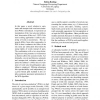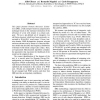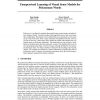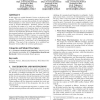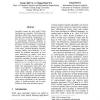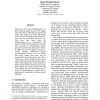EACL
2006
ACL Anthology
14 years 2 months ago
2006
ACL Anthology
In this paper a novel solution to automatic and unsupervised word sense induction (WSI) is introduced. It represents an instantiation of the `one sense per collocation' obser...
EMNLP
2004
14 years 2 months ago
2004
This paper presents Domain Relevance Estimation (DRE), a fully unsupervised text categorization technique based on the statistical estimation of the relevance of a text with respe...
ACL
2006
14 years 2 months ago
2006
Subjectivity and meaning are both important properties of language. This paper explores their interaction, and brings empirical evidence in support of the hypotheses that (1) subj...
ACL
2006
14 years 2 months ago
2006
We propose a robust method of automatically constructing a bilingual word sense dictionary from readily available monolingual ontologies by using estimation-maximization, without ...
NIPS
2008
14 years 2 months ago
2008
Polysemy is a problem for methods that exploit image search engines to build object category models. Existing unsupervised approaches do not take word sense into consideration. We...
LREC
2010
14 years 2 months ago
2010
The meanings of words are not fixed but in fact undergo change, with new word senses arising and established senses taking on new aspects of meaning or falling out of usage. Two t...
IIR
2010
14 years 2 months ago
2010
In this paper we exploit Semantic Vectors to develop an IR system. The idea is to use semantic spaces built on terms and documents to overcome the problem of word ambiguity. Word ...
COLING
2008
14 years 2 months ago
2008
Annotated corpora are only useful if their annotations are consistent. Most large-scale annotation efforts take special measures to reconcile inter-annotator disagreement. To date...
ACL
2008
14 years 2 months ago
2008
Supervised word sense disambiguation requires training corpora that have been tagged with word senses, which begs the question of which word senses to tag with. The default choice...
AIRS
2006
Springer
14 years 4 months ago
2006
Springer
This paper proposes a word sense language model based method for information retrieval. This method, differing from most of traditional ones, combines word senses defined in a thes...
